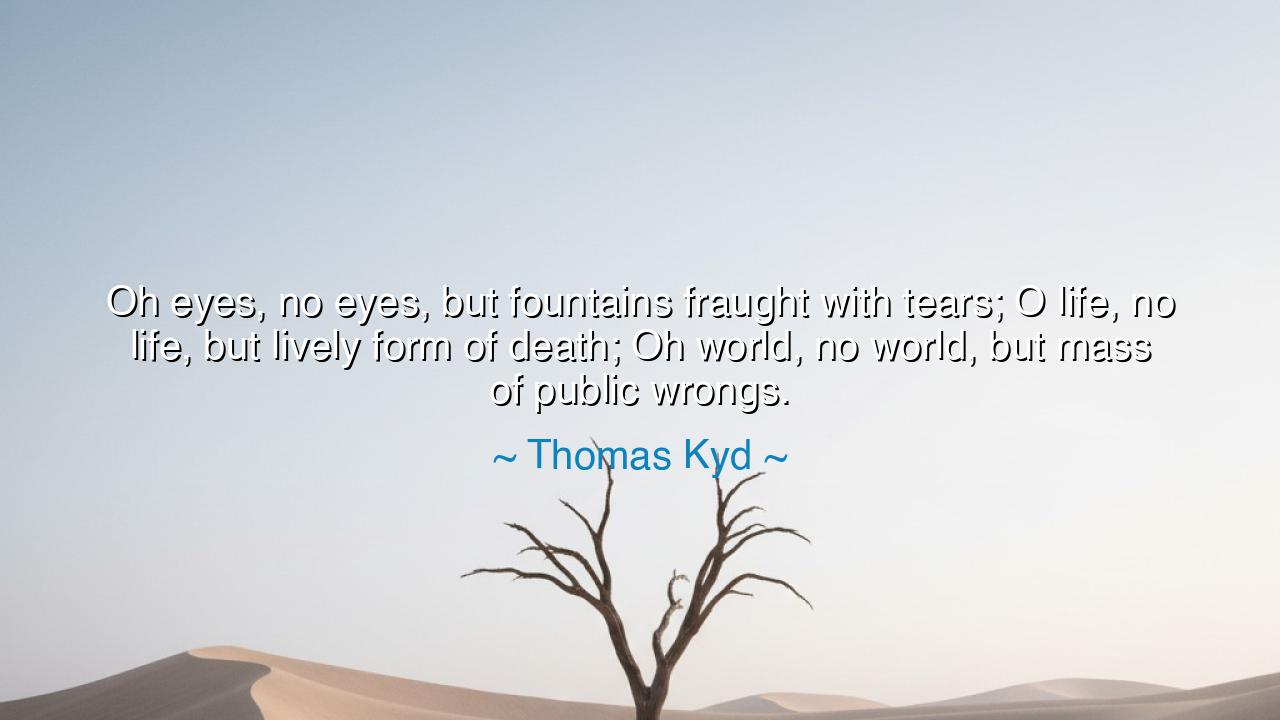
Oh eyes, no eyes, but fountains fraught with tears; O life, no
Oh eyes, no eyes, but fountains fraught with tears; O life, no life, but lively form of death; Oh world, no world, but mass of public wrongs.






“Oh eyes, no eyes, but fountains fraught with tears; O life, no life, but lively form of death; Oh world, no world, but mass of public wrongs.” — thus cried Thomas Kyd, the Elizabethan dramatist whose pen carved tragedy into the very bones of English theatre. These words, torn from the heart of his play The Spanish Tragedy (1587), speak in the ancient language of despair — the lament of a man who, beholding the cruelty of existence, finds no harmony between what life promises and what it delivers. In these lines, Kyd gives voice to the agony of the soul betrayed by the world, to the grief of one who sees the beauty of creation corrupted by injustice, love turned to loss, and truth silenced by power.
The origin of this quote lies in the mouth of Hieronimo, a father mourning the murder of his son. Once a respected judge and servant of justice, Hieronimo finds that the law he upheld cannot deliver him vengeance nor peace. His faith in man, in truth, and even in the divine order collapses. It is in this state of utter ruin that he utters these immortal words: “Oh eyes, no eyes, but fountains fraught with tears.” His very senses betray him — sight becomes blindness, life becomes death, and the world becomes not a place of order, but a “mass of public wrongs.” Through him, Kyd portrays the timeless collapse of faith in human justice — the moment when a man, stripped of meaning, sees the world for what it is: beautiful and terrible, alive yet hollow.
To the ancients, such lamentation was not foreign. The Greek tragedians knew well that man’s life stands on the edge of ruin, that suffering and wisdom are born together. Sophocles wrote of Oedipus, who, having seen too much truth, tore out his eyes in grief. Likewise, Hieronimo’s eyes become “fountains fraught with tears” — symbols of a vision too painful to bear. What once allowed him to see the world now only mirrors his sorrow. Kyd’s poetry, though written in the age of Shakespeare, echoes the same truth the ancients proclaimed: that when the just man confronts an unjust world, his heart breaks beneath the weight of his own integrity.
“O life, no life, but lively form of death” — in this paradox lies the core of tragedy itself. Hieronimo lives, yet every heartbeat is a reminder of what he has lost. Life without purpose, without love, becomes an imitation of existence — the “lively form of death.” The philosopher Seneca once said that those who live without virtue are already dead, their bodies merely walking graves. So too does Kyd show us that when the soul’s reason for being is destroyed, life becomes only the shadow of what it once was. His lament is not just personal; it is universal. It speaks to all who have lost faith in the justice of the world and have found themselves breathing, but broken — alive, yet not living.
The final line, “Oh world, no world, but mass of public wrongs,” rises beyond the personal into the political and moral. It is a cry against the corruption of society — a recognition that when injustice becomes the law, the very world ceases to be a world. What is civilization, if it cannot protect the innocent or honor truth? Kyd, writing in an England teeming with intrigue, espionage, and religious persecution, saw clearly that the public wrongs of men infect the private hearts of individuals. The decay of the state becomes the despair of the soul. Thus, his words become prophecy: when the world abandons justice, it becomes a grave for its people’s hopes.
History has seen this lament repeated in many tongues. Consider Sophie Scholl, the young German student who defied the Nazi regime with her words and courage. Standing before her captors, she saw the same “mass of public wrongs” that Kyd’s Hieronimo bewailed — a world turned against virtue. And yet, though she faced death, her spirit did not rot. Where Hieronimo’s grief consumed him, Sophie’s became defiance. She showed that even in a world ruled by injustice, one can refuse to surrender to despair. Thus, she transformed tragedy into moral victory, proving that while the world may be corrupt, the soul can remain untouched by its poison.
Therefore, O listener of tomorrow, take this teaching to heart: do not mistake the corruption of the world for the corruption of your own soul. Like Kyd’s lamenting hero, you will see suffering; you will witness injustice; your eyes, too, may become fountains fraught with tears. But remember this: though the world may fail to be the world you hoped for, you still have the power to act justly, to love, to resist despair. Do not let sorrow become blindness. Turn your tears into vision. Let your grief reveal the truth, not bury it. For the world, though often a “mass of public wrongs,” is also the stage upon which the righteous soul may still rise, luminous against the darkness, and in its endurance, redeem the tragedy of being human.






AAdministratorAdministrator
Welcome, honored guests. Please leave a comment, we will respond soon